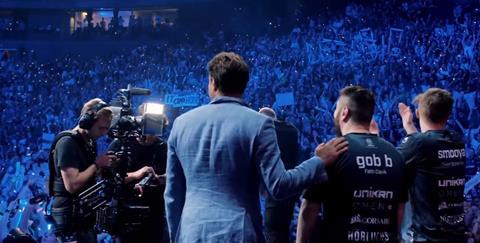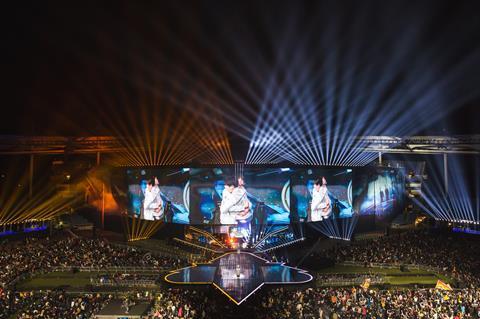The UK government has granted £4 million funding to support the growth of esports broadcasting.

The grant aims to change the future of esports broadcasting with the consortium creating 45 technology focussed jobs which will help facilitate new immersive experiences for viewers and drive the launch of new platforms contributing to boost creative revenues.
The consortium is led by ESL UK and includes technology specialists including Rewind, Focal Point VR, Dock10, Cybula and York University in a focussed two-year project as part of the Industry Strategic Challenge Fund (ISCF).
The UK Research and Innovation (UKRI) is a public body for innovation and research within the government and predicted esports to lead the technology revolution for viewer experiences with esports having the fastest growing global audience for live events.
“Weavr will transform the experiences of millions of esports fans, generate new audiences and open up new revenue streams for the broadcast entertainment industry” – UKRI
Awarding Weavr the funding, UKRI announced last week: “In 2017 over 388 million people worldwide watched esports and the number of esports fans is projected to grow a further 50% by 2020.
“Weavr will transform the experiences of millions of esports fans, generate new audiences and open up new revenue streams for the broadcast entertainment industry.”
Weavr will leverage the data-rich environment of esports to transform audience experiences through cross reality technologies by remote audiences with a longer term plan to adopt this operation into physical sports broadcasting.
The project boasts the ability for audiences to seamlessly move between virtual and physical viewing with high fidelity statistics, visualisations and data-driven stories that give deep insights into a live tournament as well as having second screens to watch immersive esports content on the go.
The use of artificial intelligence (AI) and data learning to create highly personalised viewing experiences will create interactive and individualised insights for the fans.
“These new projects will demonstrate how we can take people closer than ever before to the live action” – Margot James, MP
The University of York will bring its expertise in machine learning (ML), UX design, human computer interaction and research into the convergent space between games, interactive media and TV to help form the overall framework.
While dock10 will leverage its cutting edge production facilities to help test the framework during ESL’s live esports events and Focal Point VR will contribute their live 8k 360-degree video capture hardware and software.
Cybula’s performance computing clusters will be utilised for big data analysis & delivery and Rewind is set to help create the VR and XR apps and overall environments for the viewers experience.
Evolving mixed realities into mainstream broadcasting
In 2016, The British Academy of Film and Television Arts (Bafta) established an advisory group to help guide and educate the film, games and television industries on the opportunities and challenges of virtual reality content creation, sharing and sustainability.
The group consists of technologists, content creators and commissioners who advise Bafta on the opportunities and potential within the growing medium.
Bafta Immersive Entertainment Group chair and Rewind founder and chief executive Solomon Rogers last year wrote for IBC365 about the challenge to evolve immersive experiences to mainstream and ensure this format of storytelling.
Rogers said: “The world of immersive is evolving with great opportunities to create amazing video content for superior distribution platforms and the demand in appetite for the best content and experiences will only get stronger.”
This is the first significant UK government investment in the esport sector.
Minister for Digital and the Creative Industries Margot James said: “The UK is home to some of the world’s leading digital and creative talent. Through our modern Industrial Strategy and multi-million pound creative industries sector deal, we are bringing them together to give audiences a truly unique experience.
“The growth of immersive technology has the power to transform the way in which we watch theatre, play games or go to the cinema, and these new projects will demonstrate how we can take people closer than ever before to the live action.”
The ISCF’s ‘Audience of the Future’ challenge looks to unite creative businesses, researchers and technologists in the UK together to create the next generation of highly immersive experiences and drive creativity.

The project will operate over the course of two years with a total of £5.8 million in funding.
According to ESL Gaming, during 2018 there were over 2.6 billion hours of esports content consumed globally across a multitude of online platforms including: Twitch, Youtube, Mixer, Facebook and Twitter.
The variety of consumption points included live audiences, virtual reality and traditional single screen content. ESL stated the esports industry has been on the rise with thanks to the recognition from the mainstream broadcasters and has seen steady growth over the last five years.
UKRI expects the funding to drive engagement with esports and offer insight into methods of engagement in immersive experiences and opportunities for commercialisation.
Riot Games Head of esports Mo Fadl, told IBC365 last November the centre piece for UK’s business and entertainment growth is esports with the industry on track to become a billion-dollar business.
IBC365 webinar: Esports goes mainstream
Join the discussion on Thursday 24 January at 4pm GMT
























No comments yet